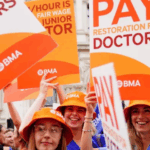The UK government will not immediately impose retaliatory measures in response to US President Donald Trump’s renewed steel and aluminum tariffs, despite mounting pressure from the industry and international allies, the BBC has learned.
The tariffs, which will take effect on March 12, impose a 25% import tax on all steel and aluminum entering the US. While both Canada and the European Union have vowed to hit back with countermeasures, UK officials are taking a cautious approach to avoid escalating trade tensions.
A government source stated that “cool heads” were needed and warned that retaliatory tariffs might not be in the best interest of the industry. Instead, UK ministers will meet with steel executives and union leaders this week to discuss the country’s response.
Strategic Positioning in Global Trade
The UK’s reluctance to join its G7 allies in an aggressive stance appears to be a deliberate strategy to differentiate itself in international trade policy. Prime Minister Sir Keir Starmer’s office declined to criticize Trump’s decision, emphasizing that the government would act in the national interest.
“We will take a considered approach to this. We will engage with the US on the detail, but the government is clear we will work in our national interest,” a spokesperson said.
The economic impact of the tariffs could be significant. The UK exports around 10% of its steel to the US, with some specialty steel manufacturers relying on the American market for a large share of their business.
Industry Leaders and Unions Demand Action
Trade body UK Steel has strongly condemned the tariffs, calling them a “devastating blow” to the industry.
“President Trump has taken a sledgehammer to free trade with huge ramifications for the steel sector in the UK and across the world,” the group said.
The Unite union, which represents steelworkers, urged the government to increase domestic steel purchases to counter the effects of US tariffs.
“Trump’s announcement should be a wake-up call for this government,” a Unite spokesperson said.
Can a Trade Deal Be Reached?
While some within the UK government are urging diplomatic negotiations, Chancellor Rachel Reeves remains optimistic about a potential resolution. Speaking on The Political Party podcast, she expressed confidence that a trade deal could be struck.
“I strongly believe that a deal can be done,” Reeves said.
However, she also made it clear that she does not support tariffs in general:
“I don’t believe in tariffs. I don’t want to see more tariffs.”
Meanwhile, UK ambassador to the US Lord Mandelson emphasized the importance of maintaining strong diplomatic ties with Washington, urging British leaders to “respect and understand” Trump’s position.
Lessons from Past Trade Disputes
This is not the first time the US has imposed steel and aluminum tariffs. Trump previously introduced similar measures in 2018, but the UK—along with several other countries—later negotiated exemptions.
It remains to be seen whether the Starmer government can replicate that success or if it will be forced to reconsider its cautious approach should the economic impact worsen.
For now, the UK is taking a wait-and-see approach, balancing the interests of its steel industry, international trade partners, and broader economic strategy.

















